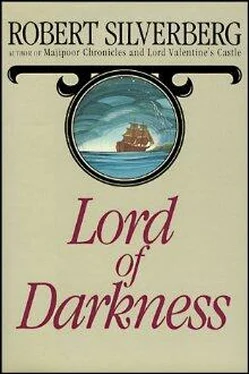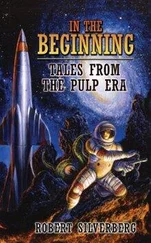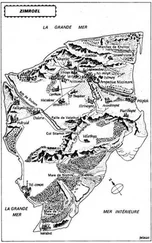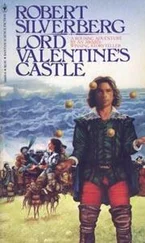Robert Silverberg - Lord of Darkness
Здесь есть возможность читать онлайн «Robert Silverberg - Lord of Darkness» весь текст электронной книги совершенно бесплатно (целиком полную версию без сокращений). В некоторых случаях можно слушать аудио, скачать через торрент в формате fb2 и присутствует краткое содержание. Год выпуска: 1983, ISBN: 1983, Издательство: Arbor House, Жанр: Исторические приключения, на английском языке. Описание произведения, (предисловие) а так же отзывы посетителей доступны на портале библиотеки ЛибКат.
- Название:Lord of Darkness
- Автор:
- Издательство:Arbor House
- Жанр:
- Год:1983
- ISBN:0-87795-443-7
- Рейтинг книги:5 / 5. Голосов: 1
-
Избранное:Добавить в избранное
- Отзывы:
-
Ваша оценка:
- 100
- 1
- 2
- 3
- 4
- 5
Lord of Darkness: краткое содержание, описание и аннотация
Предлагаем к чтению аннотацию, описание, краткое содержание или предисловие (зависит от того, что написал сам автор книги «Lord of Darkness»). Если вы не нашли необходимую информацию о книге — напишите в комментариях, мы постараемся отыскать её.
Lord of Darkness — читать онлайн бесплатно полную книгу (весь текст) целиком
Ниже представлен текст книги, разбитый по страницам. Система сохранения места последней прочитанной страницы, позволяет с удобством читать онлайн бесплатно книгу «Lord of Darkness», без необходимости каждый раз заново искать на чём Вы остановились. Поставьте закладку, и сможете в любой момент перейти на страницу, на которой закончили чтение.
Интервал:
Закладка:
“King Philip has enough of those already,” I said.
“Aye, but this will not be King Philip’s! He does not meddle in the lands overseas that were Portugal’s before the two kingdoms were joined,” said Barbosa, “and King Philip will not rule Portugal forever.” And he looked about, perhaps wondering if he had been overheard, though why any other of these Portugals should mind that Barbosa was treasonous toward the Spanish king is hard for me to comprehend.
A day came when Africa darkened the horizon, weeks later. And as our vessel glided on a glassy sea into the harbor at São Paulo de Loanda in the land of Angola, the boatswain came to us with our chains and indicated with tosses of his head that we should submit to them once more.
This São Paulo de Loanda lies on a great bay, called the Bay of Goats, that provides a tolerable haven for shipping. The closing of this harbor is made by a certain island known as Loanda, which means in the language of the place “bald,” or “shaven,” because it is a very low place without any hills. Indeed, it scarce raises itself above the sea. This island was formed of the sand and dirt of the sea and of a rivermouth a little south of the town, the River Kwanza, whose waves meeting together, and the filthy matter sinking down there to the bottom, in the continuance of time it grew to be an island. It may be about twenty miles long, and one mile broad at the most, and in some places only a bow-shot’s width from side to side.
As we passed by this island Barbosa said to Torner and me, “On that isle the black King of the Kongo has his money-mine, and pulls forth each year great store of wealth.”
“Gold, you mean?” said Torner.
This Barbosa laughed. “Nay, good friend. Shells of the sea is what these simple folk prize the most!”
He laughed as if to scorn it, a great curling hard-eyed laugh of contempt, and told us how women go on the beaches and at depths of two fathoms and more they scoop up sand in their baskets, and afterwards take little curved shells, smooth and bright, from the waste matter. These are the money of the land. “Gold and silver and other metals are not money here,” declared Barbosa. “In sooth, with these shells you can buy gold and silver, or anything else! But these are only silly savages, do you see?”
We laughed with him, Torner and I, for we saw it as comic, and passing strange, that pretty-colored shells should be valued even above gold.
But at that time I was still new to the far corners of the world, and I looked at everything with the blinkered eyes of ignorance and narrow compassion. Time has given me a shade more of wisdom, and I think now that there is no one righteous path in anything, but that each path is righteous in its own way, and so why should pretty shells not be beloved to these people even as pretty yellow or white metals are to us? All are scarce goods to find, that must be scavenged from the earth with toil, and all have beauty, and none has much use except as an article of commerce. Yet I could not have argued such matters with Barbosa at that time. Nor, by the bye, do I share with him now the thought that the people of this land are mere silly savages; but all this wisdom was very costly in the learning.
Angola shimmered in the clear torrid daylight like a land of dreams, none of them happy ones.
Torner had drawn me a rough map. Angola sits along the southwestern coast of Africa, about midway between the great bulge of Guinea to the north and the Cape of Bona Speranza to the south. Running above Angola on the coast is the kingdom of the Kongo, joining to it as Spain joins to Portugal, and above that is another kingdom known as Loango, and there are sundry other smaller kingdoms inland from these three in those parts.
Strange names. Rumbling mouthfuls of sound. Mpemba, Mbamba, Mbata, Nsundi, Mpangu, Soyo. The province of the Ambundu. The territories of Wembo, Wando, Nkusu, Matari. The regions of the wild men, the flesh-eating Jaqqas, Calicansamba, Cashil, Cashindcabar. Devil-names. Names of harsh music, full of drums and shrill skirling outcry.
Some of these names Torner told to me, as we peered on the map he had scrawled. Some of them I heard later after, whispered to me in the forest by frightened men. I bear scars to remind me of those names now. Drops of my blood lie in the dark moist soil of those places, and from my blood great ollicondi trees have sprouted in these years past, and cedars and palms, and trees without any names at all. I have seen with my eyes the province of Tondo and the great city of Dongo and the river called Gonza, and more, so much more that my brain fills and overflows with the bursting memories of it all. Kingdoms: Angola, Kongo, Loango. Dreamlands.
Nay, though, not dreamlands to their own people, but right and proper dominions, such as are Portugal and France and Sweden in our world, or England herself. The King of the Kongo is the supreme monarch, whose title is Manikongo, and both Angola and Loango are deemed subject to him. But the powers of that king have greatly been diminished of late, and in any event the Portugals have made a jest of all the solemnities of these kingdoms by imposing their own government and their own worship and their own customs as far as possible upon the black folk.
Captive though I was, dismally far from home with no hope of returning, yet did I behold this new place with eyes of wonder. And the sky-high green-crowned trees ashore were things of miracle to me, and the heat of the air, and the smells, the sounds, the dazzle of the light.
Our weighty vessel made its way as deep into the harbor as it dared, and cast its anchor. And then small boats with oars and sails came to fetch us. These were made of palm-tree wood, joined together and framed after the manner of our boats. As we were conveyed to the mainland we saw the channel full of these boats, taking fish, for these are rich waters, heavy with sardines and anchovies, and also sole and sturgeon and an abundance of wholesome crabs.
We drew up to the shore. And saw a grim platoon of somber-faced Portugals waiting for us, dark-haired, dark-eyed, swarthy-skinned little men, sweltering in their full armor under the terrible sun. As though we were a company of great Judases, Torner and I, that durst not be let escape.
They glared most foully at us. Their hard cold staring eyes were stones that they would have hurled at us to pierce our skins. I felt the pressure of their hatred, that dull heavy hostile weight, as I had those first few days of our ocean crossing. And I gave them glare for glare, scowl for scowl. Am I your enemy? Porque? Because my country is your country’s enemy? Because my Queen is the Pope’s enemy? Because we will not sit and mumble at our devotions, and call upon the saints and other false gods? Because we loathe the Latin singsong, and have our own lawful book of prayer? Well, then, so be it, Portugals, I am your enemy! But only because you choose to be mine.
They jeered. They shouted things in their thick-mouthed lingo, not knowing that I understood the half of their foulness. They cursed the Queen as an excommunicated whore and the daughter of a whore and witch. They said the same of my mother and Tomer’s. I kept my peace, though it was hard. Jesu, it was hard! I would have cried things at them of the Pope and the stinking luxuries he wallows in, and the monks who fill themselves on altar wine and couple in the cloisters like devils, and such stuff, but worse. Yet I kept my peace.
I said only at last, in my best Portugee, as they marched me onto the dry black earth of their city, “The Devil will chew your souls, ye Papist swine,” and left them gasping in amazement that I knew their tongue.
The town, for the supposed capital of a supposed great empire in the making, was small and shabby. This part of Angola yieldeth no stone, and very little wood, and the buildings I saw were largely made of bulrushes and fronds of palm, covered with earth. There were of course certain structures much more grand, the governor’s palace and the houses of government, and the great-steepled red-walled church, and the high-palisaded fort.
Читать дальшеИнтервал:
Закладка:
Похожие книги на «Lord of Darkness»
Представляем Вашему вниманию похожие книги на «Lord of Darkness» списком для выбора. Мы отобрали схожую по названию и смыслу литературу в надежде предоставить читателям больше вариантов отыскать новые, интересные, ещё непрочитанные произведения.
Обсуждение, отзывы о книге «Lord of Darkness» и просто собственные мнения читателей. Оставьте ваши комментарии, напишите, что Вы думаете о произведении, его смысле или главных героях. Укажите что конкретно понравилось, а что нет, и почему Вы так считаете.












